Understanding the Vital Role of Homemaking in Medication Safety
Medication management is a critical aspect of elderly care, especially when it involves chronic conditions and complex drug regimens. Homemaking services, often provided by trained professionals such as home health aides and nurses, play an essential role in supporting safe, accurate, and effective medication use for seniors living at home. These services encompass a wide array of activities, from organizing medications and ensuring proper storage to monitoring for side effects and coordinating with healthcare providers. This article explores how homemaking services assist elderly individuals with medication management, the roles of various caregiving professionals, best practices, and available support programs.
The Scope of Homemaking Services in Medication Management
How do homemaking services assist elderly individuals with medication management?
Homemaking services play a vital role in supporting older adults in managing their medications safely and effectively. These services often involve trained professionals, such as nurses from organizations like MedStar Health, who provide comprehensive assistance tailored to each individual’s needs.
One of the primary ways homemaking services help is by developing personalized medication schedules. These schedules are designed based on the patient’s specific prescriptions, over-the-counter medicines, supplements, and herbal remedies. Creating a clear and structured plan ensures correct timing, dosage, and adherence, reducing the risk of missed doses or accidental overdoses.
In addition, homemakers review and organize medications, including prescribed and non-prescribed products. They use tools like pill organizers and medication lists to keep track of what has been taken and what remains. This organization helps prevent errors and facilitates easier medication management, especially for those on multiple or complex regimens.
Education is another crucial aspect of homemaking services. Professionals educate both elderly patients and their caregivers on the proper use of medications. They explain how and when to take each medicine, discuss potential side effects, and instruct on recognizing adverse reactions. This knowledge empowers patients to adhere to their treatment plans and seek help promptly when needed.
Safe storage and label checking are emphasized to maintain medication integrity and prevent accidental ingestion by children or pets. Homemakers advise on storing medicines in cool, dry, and secure locations, as well as verifying labels before administration, to minimize errors.
Coordination with healthcare professionals is a key component. Homemakers communicate any concerns, side effects, or changes in health status to physicians, ensuring the treatment plan remains appropriate. They support medication adjustments and reinforce instructions during visits, helping to prevent drug interactions and adverse effects.
Overall, these services foster a comprehensive approach to medication safety. By ensuring proper organization, education, storage, and professional communication, homemaking services significantly reduce medication-related problems, promote adherence, and contribute to better health outcomes for elderly individuals living at home.
This integrated support enables seniors to maintain independence while managing their health conditions effectively, providing peace of mind for families and caregivers alike.
For more information, searching "Medications management elderly homemaking services" can lead you to additional resources and local providers specializing in patient-centered medication assistance.
The Role of Home Health Aides in Medication Support
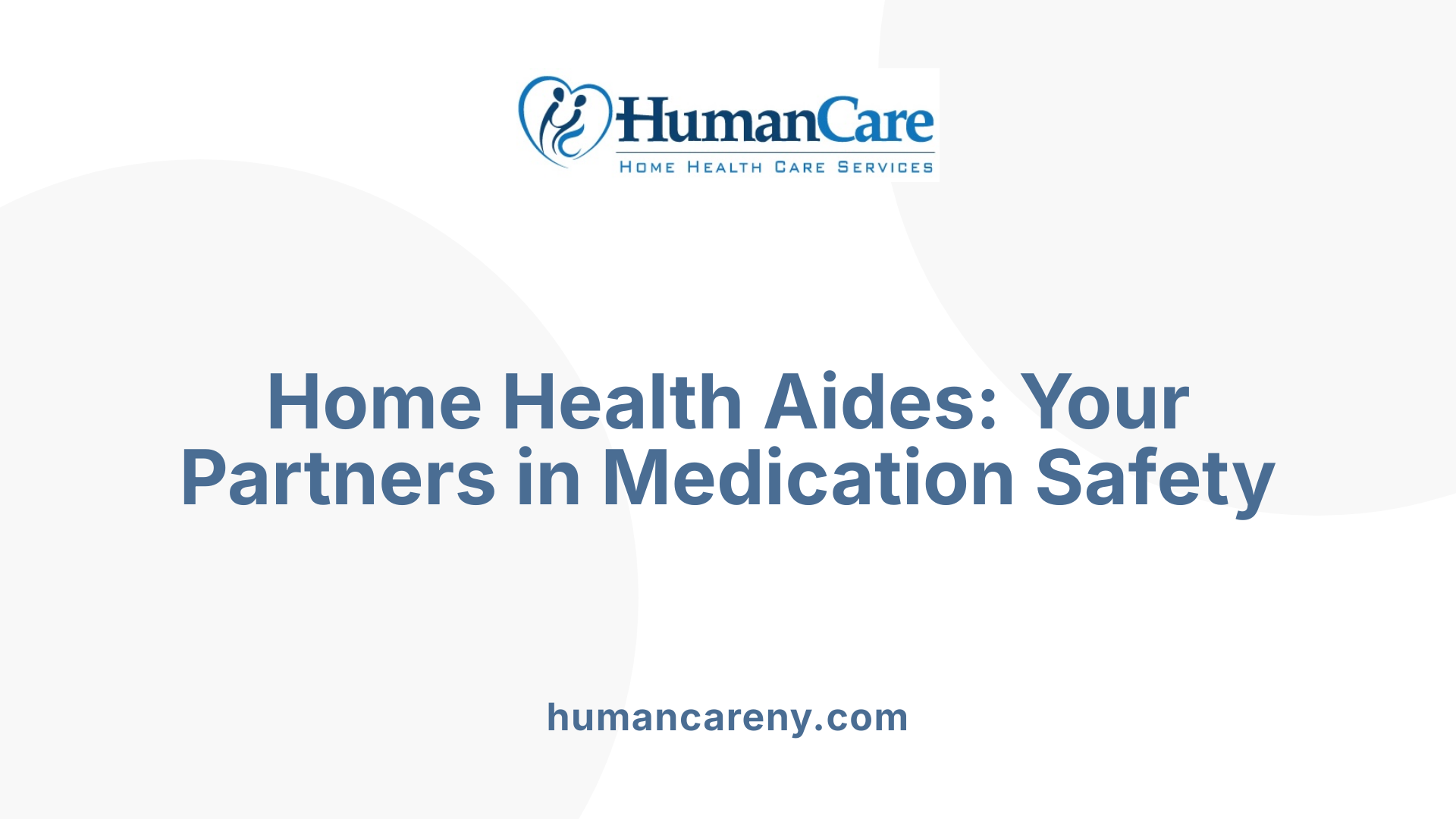
What is the role of home health aides in medication management for elderly individuals?
Home health aides are crucial in helping older adults manage their medications safely and effectively. They assist with reminder systems that prompt clients to take their medications on time, which is vital for adherence, especially for those with complex or multiple prescriptions.
Depending on state laws, regulations, and their specific training, aides may also help with opening medication containers and administering certain medications. These often include topical treatments, eye drops, patches, or oral medications, but their capabilities are guided by strict protocols to ensure safety.
Aides are trained to verify the identity of the patient to guarantee the correct individual receives the right medication. This process helps prevent medication errors such as administering the wrong drug or dose.
In addition to direct medication assistance, home health aides support overall health monitoring by recording vital signs and assisting with medical equipment like blood pressure monitors or insulin pumps. This activity can help detect early signs of adverse drug reactions or health changes that may require medical attention.
Supervision from healthcare professionals and ongoing training are essential components of their role. Proper education ensures aides understand medication protocols, recognize side effects, and follow safety procedures, which collectively help reduce medication-related problems.
Overall, home health aides serve as a vital link between healthcare providers and elderly clients, ensuring medications are taken correctly, side effects are monitored, and the clients' overall well-being is supported.
Best Practices for Home-Based Medication Management
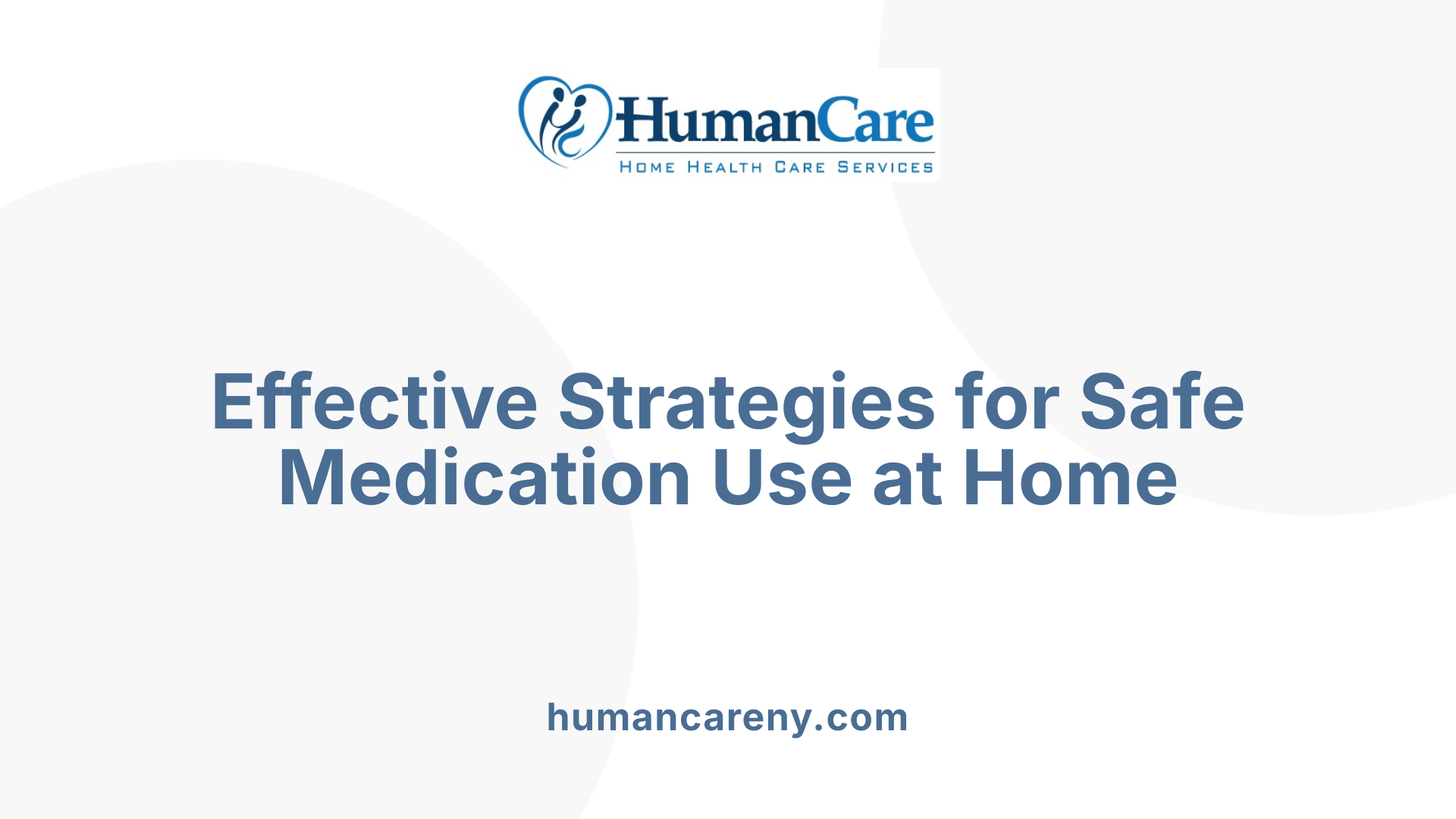
What are best practices for managing medications at home with assistance from homemaking or home health services?
Managing medications effectively at home is critical for older adults and individuals with disabilities. When utilizing homemaking or home health services, several strategies can promote safety, adherence, and overall health.
First, creating a comprehensive, detailed medication list is essential. This list should include every medication the individual takes—prescriptions, over-the-counter drugs, herbal supplements, and vitamins. Each entry should specify the medication name, dosage, prescribed frequency, administration instructions, purpose, prescribing doctor, and typical side effects. Updating this list regularly and sharing it with healthcare providers and caregivers ensures everyone is informed.
Using pill organizers significantly improves medication adherence. These devices with separate compartments for each day and dose help prevent missed or double doses. Establishing consistent routines—such as taking medications immediately after brushing teeth or during breakfast—reinforces adherence and makes managing multiple medications easier.
Refilling medications on time is critical. Synchronizing refills through a single pharmacy or setting automatic reminders prevents disruptions. Many pharmacies provide refill alerts, and utilizing electronic medication management apps can streamline this process.
Maintaining continuous, open communication with healthcare professionals is vital. Regular reviews of medication purposes, potential side effects, and interactions help adjust therapy as needed and prevent adverse reactions. Caregivers should notify healthcare teams if the individual experiences difficulty taking medications, side effects, or any new symptoms.
In addition to medication-specific strategies, safety measures around the home promote overall wellbeing. Installing grab bars, shower chairs, or handrails reduces fall risks. Ensuring medications are stored in a cool, dry, and secure location—away from children or pets—helps maintain medication integrity.
Encouraging independence in activities of daily living while providing support when needed fosters dignity and comfort. Using visual cues such as large-print labels and labels with tactile markers can aid those with visual impairments.
Finally, involving family members or other caregivers in daily routines and monitoring enhances safety. They can help track medication schedules, observe for side effects, and assist with refills and appointments.
Implementing these best practices supports safe, effective medication management at home, promoting health and independence for elderly and disabled individuals.
Strategies for Safe Medication Use in Seniors
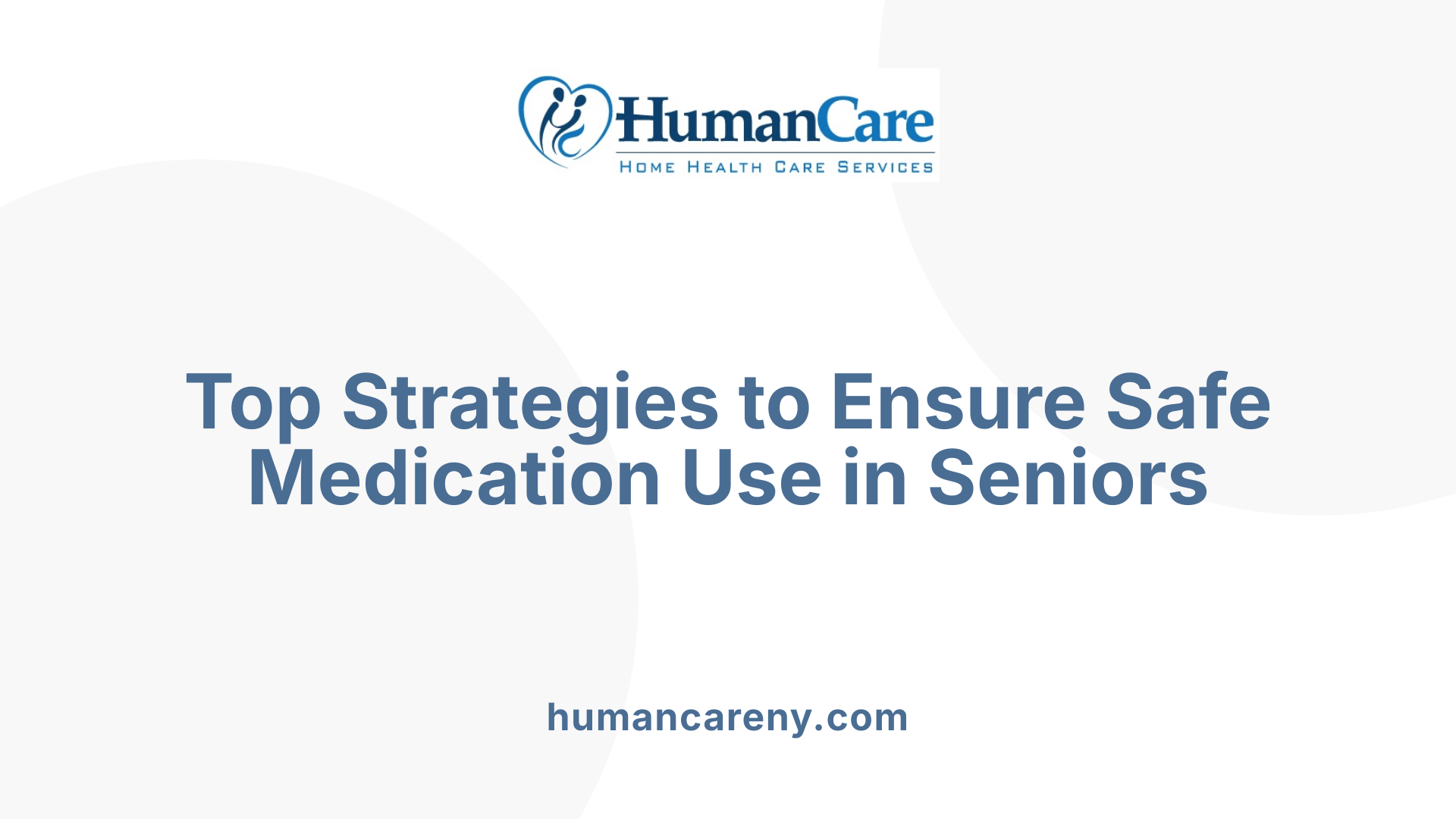
What strategies can help seniors safely manage their medications?
Managing medications safely is crucial for older adults and persons with disabilities, as they are more vulnerable to medication-related problems (MRPs). Several practical strategies can significantly reduce risks and promote proper medication use.
First and foremost, adhering strictly to healthcare provider instructions is essential. Seniors should take their medicines exactly as prescribed, avoiding adjustments without consulting a healthcare professional. Sharing medications with others or using someone else's prescriptions can lead to dangerous interactions and side effects.
Proper storage of medications is another vital step. Medications should be kept in a cool, dry place, away from direct sunlight and humidity, with child-proof containers to prevent accidental ingestion. Regularly checking expiration dates helps ensure medicines are effective and safe to use. Discard expired drugs properly to avoid potential harm.
Maintaining an accurate and current medication list is crucial. This list should include medication names, dosages, timing, purposes, prescribing doctors, and any adverse effects experienced. Sharing this list with healthcare providers during appointments helps prevent harmful drug interactions and duplication of therapy.
Beyond storage and documentation, seniors should be aware of how foods, beverages, and over-the-counter products can influence medication efficacy. For example, grapefruit juice can interfere with certain drugs, and alcohol may increase side effects or diminish medication effectiveness.
Periodic reviews with healthcare providers, ideally annually or when new medications are added, help identify potential issues early. These reviews can include medication reconciliation—comparing prescribed lists with actual consumption to spot discrepancies.
Pharmacists are also excellent resources for medication counseling, explaining how to take medicines correctly and informing about possible interactions. Using technological tools such as reminder apps, pill organizers, or digital alerts can improve adherence.
Incorporating these strategies creates a comprehensive approach. Combined, they help older adults enjoy better health outcomes, reduce hospitalizations from medication errors, and maintain their independence longer.
| Strategy | Specific Actions | Purpose |
|---|---|---|
| Strict adherence | Take meds as prescribed, avoid sharing | Prevent dosing errors and interactions |
| Safe storage | Keep medications in cool, dry places, check expiration dates | Avoid ineffective drugs and accidental poisoning |
| Updated medication list | Record and share detailed medication info | Prevent drug interactions and duplications |
| Awareness of food/drug effects | Avoid alcohol, monitor food interactions | Maximize drug effectiveness and minimize side effects |
| Regular healthcare reviews | Annual check-ins, medication reconciliation | Detect and resolve MRPs early |
By combining these methods, seniors can significantly protect their health and ensure their medications contribute positively to their well-being.
Support Programs and Resources for Medication Management
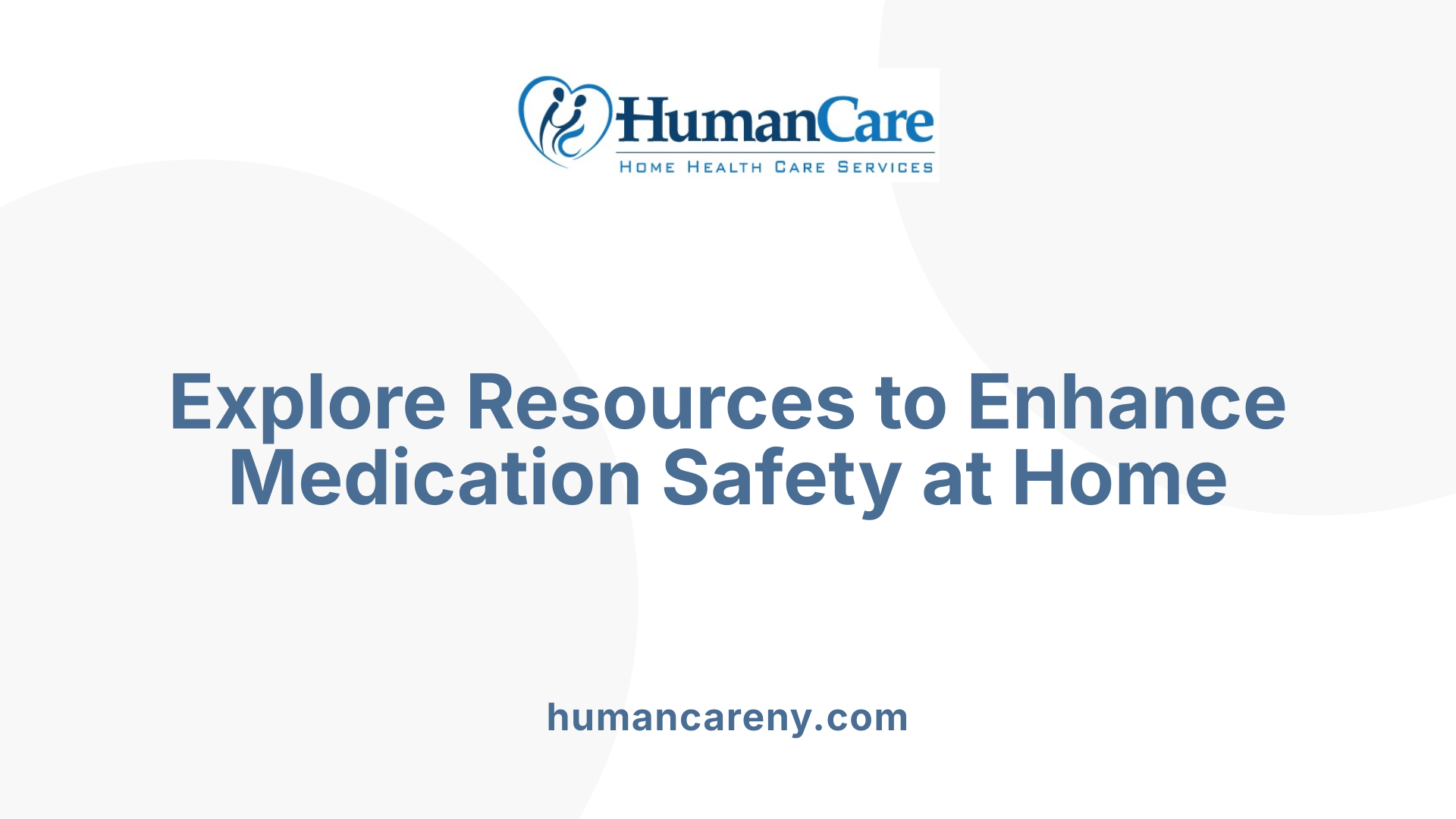
Are there programs or services designed to support medication management for the elderly at home?
Yes, a variety of programs and services are available to assist older adults with medication management within their homes. These initiatives aim to promote safety, adherence, and overall health outcomes by providing tailored support.
Home health care services often include essential medication tasks. Licensed professionals and home health aides help with administering medications, such as insulin injections, wound care, and blood sugar testing. They also assist with medication reconciliation, which involves reviewing all prescribed, over-the-counter, herbal, and vitamin medications to ensure consistency and prevent errors. These services foster safe medication use and help avoid adverse effects or drug interactions.
Digital platforms play a significant role in modern medication management. Programs like HomeMeds utilize electronic tools and in-home assessments to detect potential medication-related problems, verify proper use, and recommend necessary adjustments. Such systems often include remote review capabilities where healthcare providers monitor adherence, check for side effects, and communicate with patients or caregivers.
Geriatric care managers and pharmacist-led programs contribute to managing complex medication routines. These professionals coordinate care plans, interpret doctors' instructions, and track medication effects. In supervised medication management programs, registered nurses oversee medication schedules, especially for individuals with multiple prescriptions, ensuring proper administration and monitoring for side effects.
Community programs aimed at medication safety include local health department initiatives, senior centers, and nonprofit organizations. They offer education, counseling, and adherence support, such as providing medication calendars, pill organizers, and reminder tools to encourage consistent medication intake.
Remote and in-home assessment tools are increasingly utilized to evaluate physical and cognitive abilities affecting medication management. Devices like electronic pill dispensers, reminder apps, and smart home sensors can monitor medication routines, alert caregivers or healthcare professionals if doses are missed, and facilitate timely interventions.
Collectively, these services and tools aim to reduce medication errors, prevent hospitalizations, and support maintaining independence for older adults living at home. They serve as a critical resource, harnessing technology and professional expertise to promote safer medication practices.
| Program/Service Type | Description | Benefits | Additional Notes |
|---|---|---|---|
| Home health care services | In-home administration and monitoring | Ensures proper medication use, helps manage complex regimens | Tasks include injections, testing, medication reconciliation |
| Digital platforms (e.g., HomeMeds) | Electronic assessment and review tools | Detects problems early, improves adherence | Often involve remote review by professionals |
| Geriatric care managers | Coordination and oversight | Integrates care, interprets orders | Led by trained healthcare professionals |
| Community programs | Education, counseling, reminder tools | Promotes adherence and safety | Offer free or subsidized services |
| Remote assessment tools | Electronic devices and apps | Monitors routines, alerts caregivers | Enhances supervision between visits |
These resources combine to create a comprehensive support network that ensures elderly individuals can manage their medications safely and effectively at home.
Legal and Policy Considerations in Medication Administration
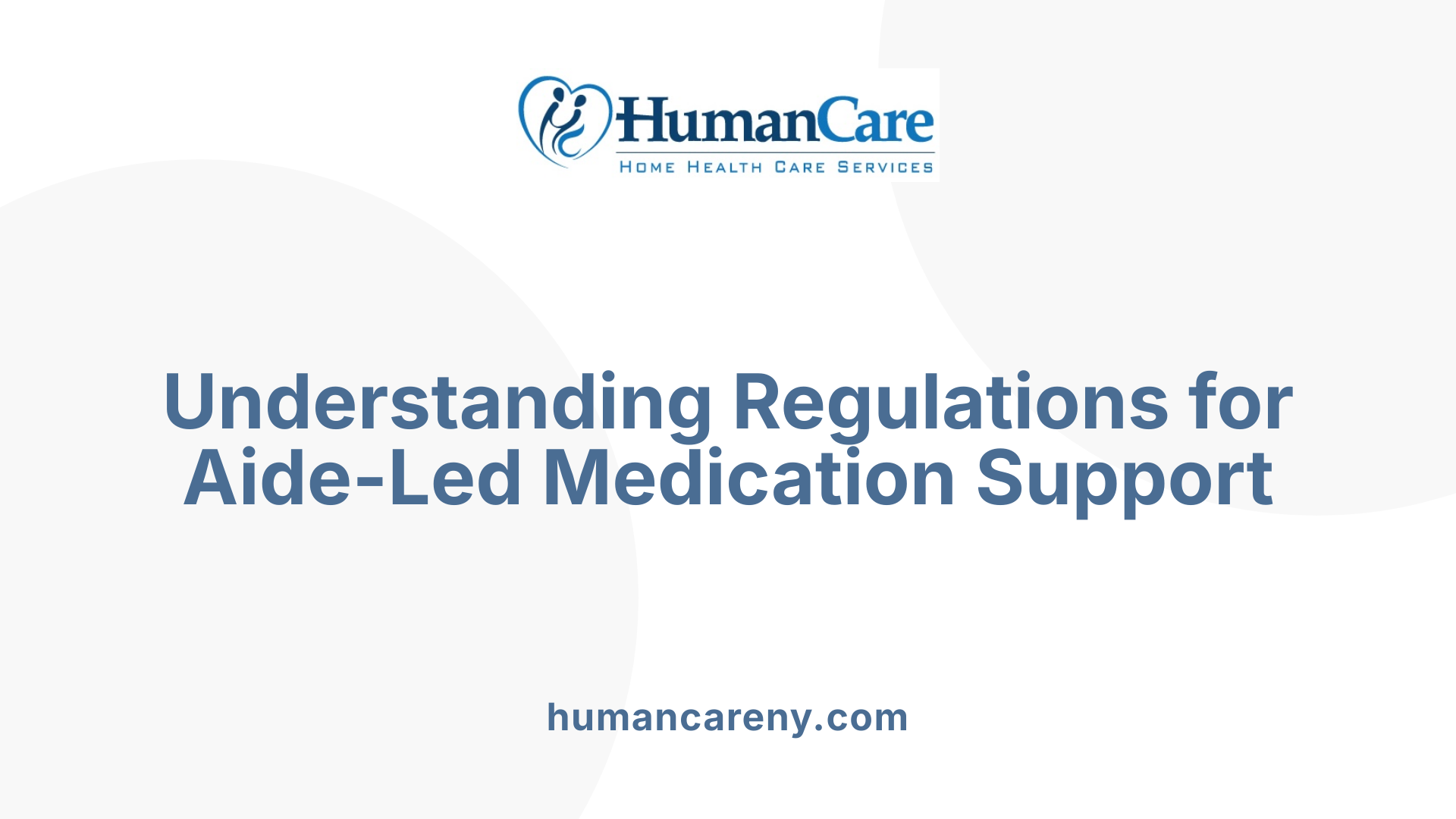
What policies and guidelines regulate medication administration by homemaker-home health aides?
Homemaker-home health aides play a vital role in supporting medication management for elderly and disabled individuals. To ensure safety and consistency, their training, certification, and practice are governed by strict regulations set by state health authorities, such as the Connecticut Department of Public Health.
These policies specify that aides must undergo comprehensive education and skill training before engaging in medication administration activities. Certification requirements include understanding medication types, proper handling techniques, storage protocols, and recognizing adverse reactions. Only qualified aides are permitted to administer medications, and ongoing educational updates are often mandated to keep skills current.
Requirements for education, skill training, and certification
Aides must complete specialized training programs focusing on medication safety, including demonstration of competence through assessments. Certification processes typically involve passing written and practical exams that verify their knowledge of medication procedures, safety measures, and emergency response.
Training covers a wide breadth of topics, such as the correct methods to pour medications, timing, storage, and documentation. Certification must be renewed periodically to ensure aides stay current with evolving best practices and regulatory changes.
Supervisory guidelines and prior approval procedures
Before aides administer medications, supervisory oversight by a licensed healthcare professional, such as a registered nurse or prescribing physician, is essential. This supervision assures the aide’s activities align with the prescribed treatment plan.
Authorization for medication administration services generally requires prior approval. Healthcare providers review and approve the plan, which includes assessments, ongoing monitoring, and documentation. Supervisors also oversee the aides’ activities during routine visits and conduct periodic evaluations to ensure compliance.
Documentation is critical; aides must record each medication administered, including time, dose, and any observations or reactions. This record-keeping is vital for continuity of care, legal accountability, and quality assurance.
Limitations on medication complexity based on client stability
The clinical guidelines specify that medication administration by homemaker-home health aides is appropriate when the client's health status is stable. If the individual’s condition is unstable or requires complex modifications, higher-level healthcare professionals should perform or directly oversee medication activities.
Medications considered suitable for aide administration are typically straightforward, such as pills taken once or twice daily without special handling. When the regimen involves injections, complex wound care, or medication adjustments, professional nurses or medical staff must manage medication tasks.
This framework is designed to mitigate risks by matching the aide’s scope of practice with the patient’s health needs. It helps prevent errors, adverse reactions, and ensures that vulnerable populations receive safe and effective medication support within a regulated, supervised environment.
Enhancing Elderly Well-being Through Supportive Medication Practices
Effective medication management is fundamental to maintaining health, safety, and independence among seniors living at home. Homemaking services, delivered by trained professionals like home health aides and nurses, play a crucial role in ensuring medications are organized, taken correctly, and monitored for adverse effects. Implementing best practices such as creating detailed medication lists, employing technological aids, engaging families, and participating in community programs significantly enhances medication safety. Additionally, adherence to regulations governing caregiver training and medication administration ensures high standards of care. Together, these strategies foster a safer, more supportive environment where elderly individuals can enjoy their independence while managing their health effectively.
References
- Caregiverʼs Guide to Medications and Aging
- Medication Management of the Community-Dwelling Older Adult
- How Home Health Aides Assist with Medication Management for ...
- Medication management activities performed by informal caregivers ...
- Professional Caregivers Can Manage a Senior's Medications
- Medication Management for Seniors | A Place At Home
- Homemaker - Idaho Commission on Aging
- Medication Management for Seniors - Hopscotch
- The Benefits of Utilizing Homemaker Services for In-Home Care
- Medication Management - Commonwealth of Pennsylvania



